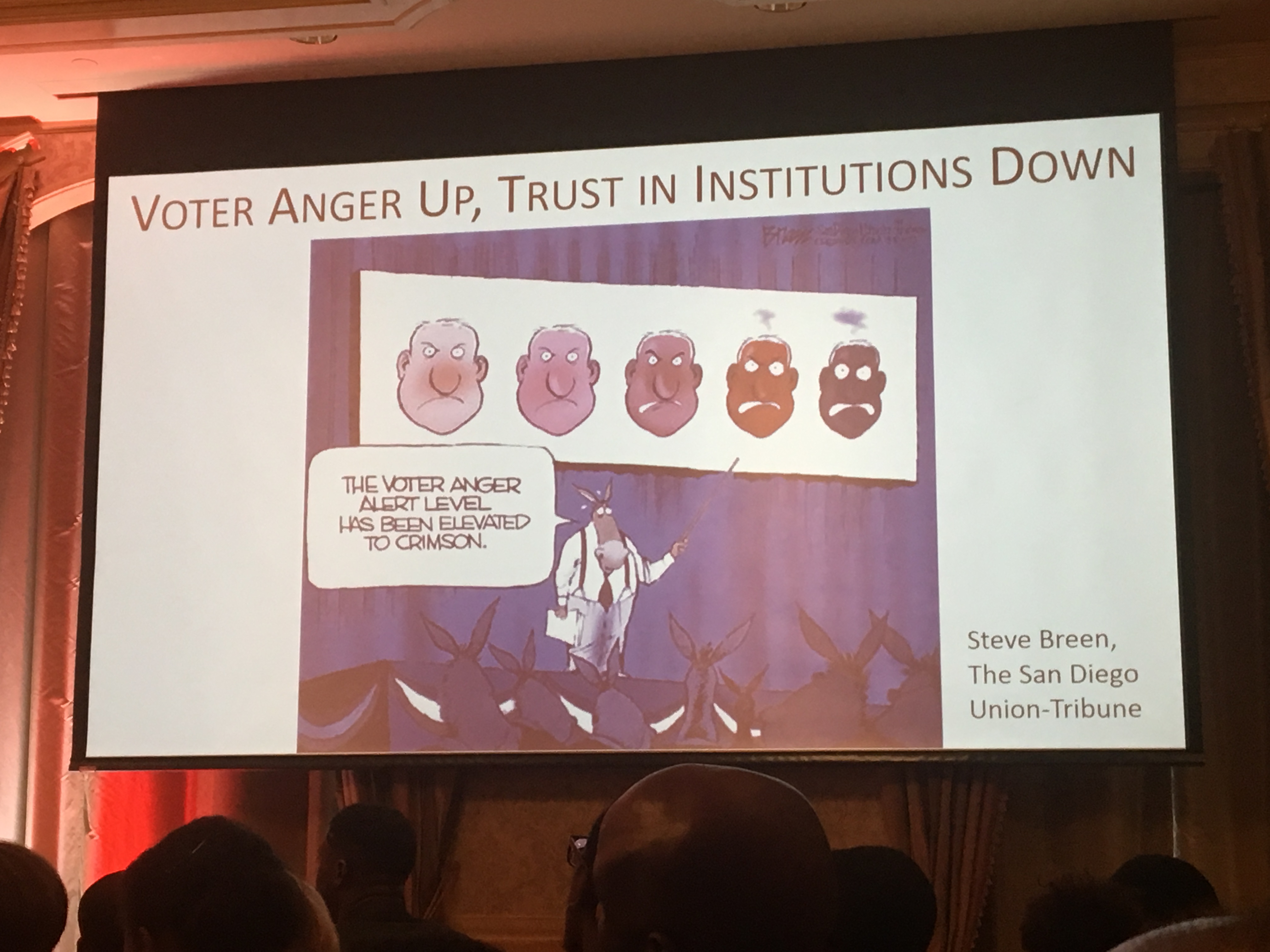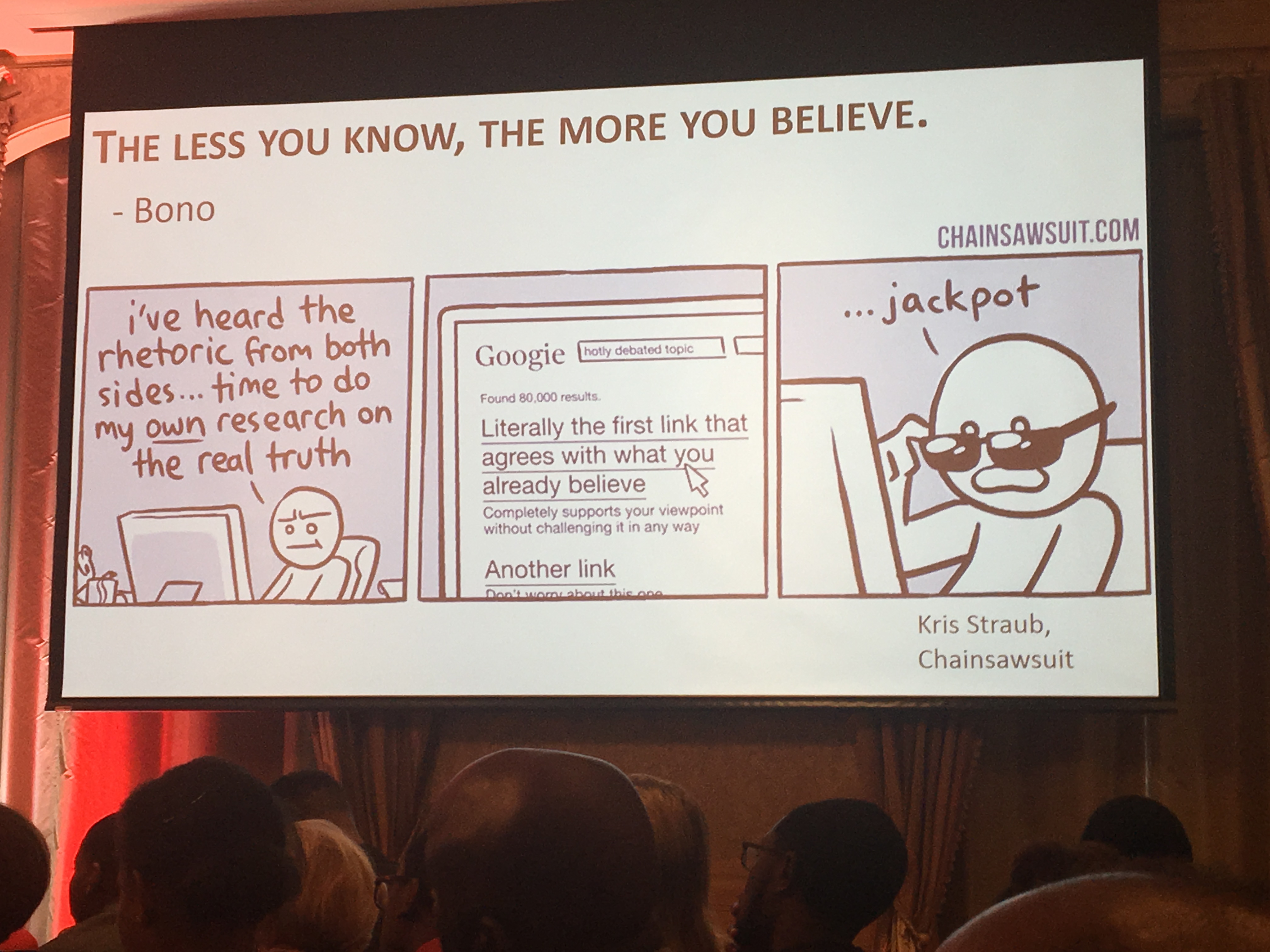Given that I was wearing my direct-from-school inordinately bright blue shorts and a plain white T-shirt in a meeting space filled with older business men and women carefully dressed in sharp suits or silken dresses, you can imagine how much I stood out as the only teen present at the Blank Family Foundation’s “News Media and the Election: A Conversation with Jeff Greenfield & Leonard Pitts” this fall. The panelists, both veteran journalists with a seemingly endless bank of information to access, addressed the relationship between the current presidential election and news media. Greenfield is an award-winning television journalist who has worked for CNN, ABC and PBS, and Pitts is a 40-year media professional, perhaps best known for his Miami Herald newspaper column. The man knows how to speak his mind in a professional way.
These two Goliaths in the industry of news media sat down at the Blank Foundation’s headquarters to lead us through a discussion focusing on voter anger being higher than ever, political fact checking being a growth industry and the many instances where journalism has failed the public this year.
As I took to my seat, the mood was set with ambient red lights tracing around the room, undercut by the buzz of reporters, cameramen, and upper crusts — who likely saw this as an opportunity to exchange information — chatting it up before all were called to their seats.
Greenfield, the 40-year television journalist, began the panel discussion by elaborating on the current air of citizen distrust in the media and larger government institutions. He stated that this distrust in those facts presented to the public led to a phenomenon he calls, “Post-Factual America: Land of the Obdurate and Home to the Willfully Ignorant.”
Leonard Pitts explained that this “post-factual America” occurs when opinions are given priority to facts in mass media. When this happens, Pitts posits, people no longer seek out the truth but instead seek affirmation of what they already believe. This “post-factual America” seems to leave no room for critical thought and productive conversation in the eyes of Pitts.
Both Greenfield and Pitts repeatedly reference the cable news network, CNN, as a main culprit of perpetuating opinion-based news.
“This way of thinking is so ingrained that news is no longer factual. Instead, as all of us have surely seen, they just set up two panels of people spouting their opinions,” Pitts said, “one for the Democrats, to the left, and the other for Republicans, to the right. The two yell at each other until the segment ends, and the viewer doesn’t remember what they argued about. That’s what we call news today.”
Attempts by the willfully ignorant to reach a consensus were likened to the tale of the Tower of Babel — in that the “post-factual” citizens may be trying to do the same thing but without a uniform set of facts. It’s as if they don’t speak the same language.
In this new world, the panelists said, fact checking has become an act in futility. They said this, specifically, when referring to the 2016 presidential election.
Pitts tells the story of a Sunday morning when his 7-year-old son remarked how the media was a terrible institution. Pitts, engaged by the first grader’s bold statement, asked him what he thought the media was. His son responded that the media were bad people who went to your house to tell you lies. Pitts said that he imagines the thought process of those voting for Republican candidate Donald Trump is similar, but he would hope slightly more educated.

Greenfield said Trump’s campaign has been such a relative success is due to his “outsider” perspective. The relationship between politicians and media is supposed to be rise, scrutinize, decline, he said, but as for Trump, the pattern has been rise, scrutinize, rise.
In former Secretary of State Hillary Clinton’s case, Pitts quoted the political play “Hamilton” when he said: “Why do you assume that you’re the smartest in the room? Why do you assume that you’re the smartest in the room? An attitude like that is gonna lead you to your doom.”
Even further to that point is the fact that both of Clinton’s major opponents in this election have used the same tactics when campaigning: playing the role of the amateur. Both Trump and Bernie Sanders positioned themselves as the outsiders to the wider political arena, leaving Clinton as the “corrupt politician” with too many hands in too many cookie jars.
Pitts remarked that there was merit to this technique when running for political office because it resonates with disgruntled voters. The Pew Research Center survey on voter trust would certainly show why this strategy might work. Simply stated, disgruntled voters are in abundance today.
Near the end of the discussion, the panelists delved into who these voters were and why they might cast aside Clinton in favor for Trump. The demographic referenced were white males living in rural areas — for a number of reasons, the first of which was an economic vacuum in small towns.
Though commonly thought of as being plentiful in the U.S, the number of towns are decreasing in comparison to big cities. As the panelists explained it, this population decline meant fewer big corporations had factories in these small towns.
And, when you stop to think about it, it makes sense: Why hire people in the proverbial “middle of nowhere” when you could move your corporation to a metropolis with thousands, hundreds of thousands, or millions of people?
When people are rapidly losing jobs due to a lack of businesses willing to stay where they are and a candidate comes along who promises to strengthen businesses and keep jobs in the U.S … one might be inclined to chose said person.
The second cause listed for rural white males being disgruntled was their lack of representation in popular news media. This may sound odd, seeing as though white males are often over-represented in media, but the key word would be rural. How often do you see lower-class white people on the news or in readings?
Pitts spoke about an experience he had while reporting on lower-class white families in Maine.
 “While speaking to the people in Maine I expected someone who looks like me to have to be scared of the people I visited,” Pitts said. “The thing is, the people there were much more scared of me as a journalist. Perhaps they were not scared of me physically, but of what I represented. These people were scared of how I would show them on TV.”
“While speaking to the people in Maine I expected someone who looks like me to have to be scared of the people I visited,” Pitts said. “The thing is, the people there were much more scared of me as a journalist. Perhaps they were not scared of me physically, but of what I represented. These people were scared of how I would show them on TV.”
The final presentation of the night suggested that in the place of hate we should offer love. That when, in the course of this election season, we see conflict and personal attacks more represented in the news media than facts and policies, we should say something. That journalists must continue to question government as they always have, and acknowledge that today there exists two publics — one that wants to visit websites that feed off of clicks and headlines, and another that looks for unbiased news sources.
Khalil, 15, is a junior at Druid Hills High School who writes and performs spoken-word poetry in Atlanta coffee shops. Although he has only done the latter once, he hopes to increase the frequency of his performances.




